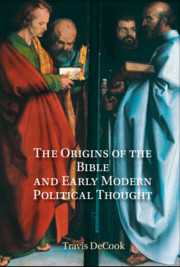 The Origins of the Bible and Early Modern Political Thought
The Origins of the Bible and Early Modern Political Thought Sovereignty, Secularization, and the Metaphysics of the Bible in Hobbes’s Leviathan
Published online by Cambridge University Press: 02 March 2021
This chapter argues that Thomas Hobbes’s imagining of the original events of biblical authorship and transmission in Leviathan play a pivotal role in his radical arguments about sovereignty and its relationship to religion. It contends that Hobbes’s emphasis on the Bible as the product of multiple layers of history is not in itself secularizing. Instead, this chapter focuses on the materialist metaphysical foundations of Hobbes’s account of the Bible’s production, transmission, and reception. The radical ways Hobbes represents the Bible’s origins and the events of its textual history buttress his argument for the sovereign’s total authority over all religious matters pertaining to the public. This is because they have the effect of eradicating any means, other than the sovereign’s wholly secular decision, by which a communal biblical meaning and authority might be actualized, including any means by which “the Bible” can be collectively recognized as such. Hobbes’s subjection of Scripture to the sovereign is thus predicated on metaphysical assumptions inimical to human participation in revelation, assumptions undergirding the untraditional scenes of biblical origin he imagines.
To save this book to your Kindle, first ensure no-reply@cambridge.org is added to your Approved Personal Document E-mail List under your Personal Document Settings on the Manage Your Content and Devices page of your Amazon account. Then enter the ‘name’ part of your Kindle email address below. Find out more about saving to your Kindle.
Note you can select to save to either the @free.kindle.com or @kindle.com variations. ‘@free.kindle.com’ emails are free but can only be saved to your device when it is connected to wi-fi. ‘@kindle.com’ emails can be delivered even when you are not connected to wi-fi, but note that service fees apply.
Find out more about the Kindle Personal Document Service.
To save content items to your account, please confirm that you agree to abide by our usage policies. If this is the first time you use this feature, you will be asked to authorise Cambridge Core to connect with your account. Find out more about saving content to Dropbox.
To save content items to your account, please confirm that you agree to abide by our usage policies. If this is the first time you use this feature, you will be asked to authorise Cambridge Core to connect with your account. Find out more about saving content to Google Drive.